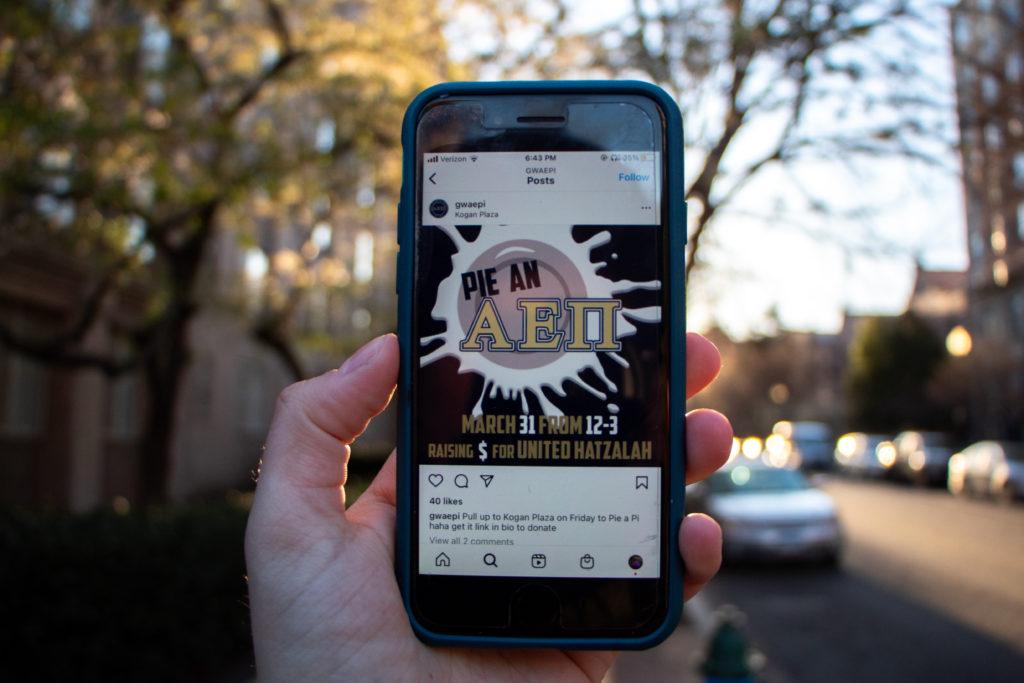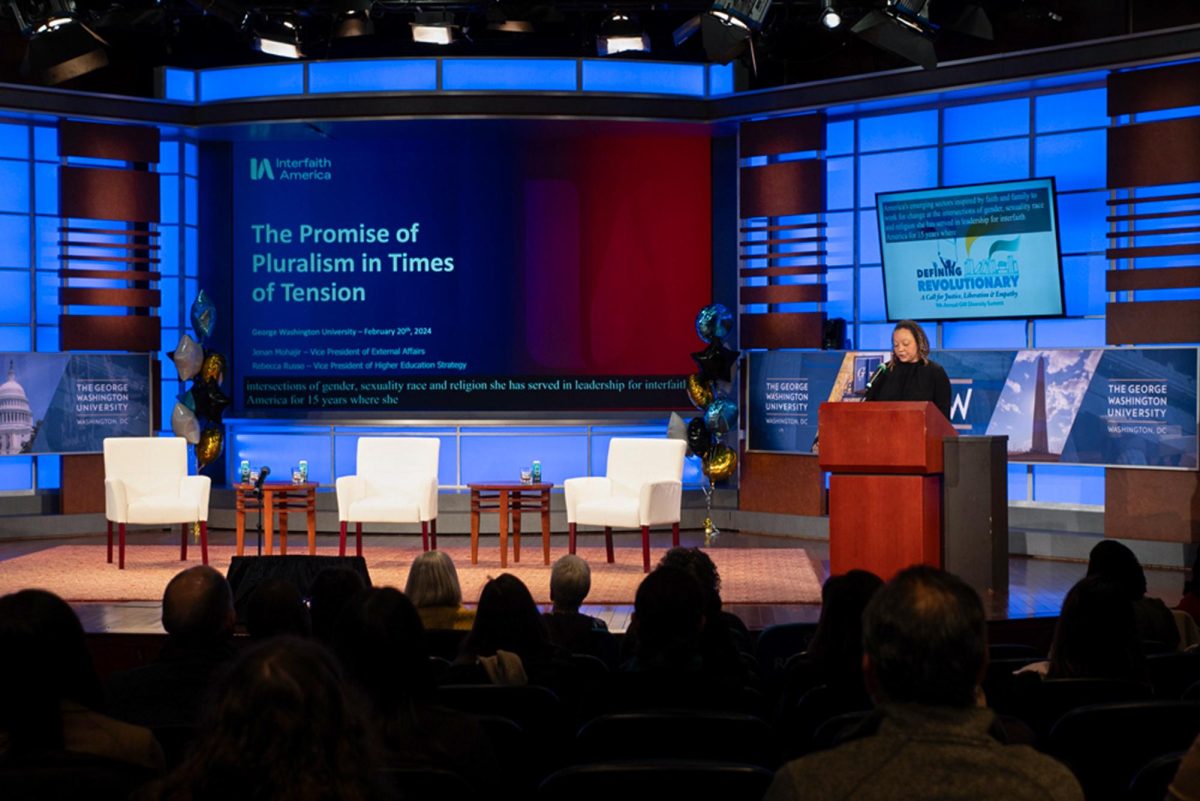A Jewish fraternity will rejoin GW’s Interfraternity Council this month, making its return to campus nearly a decade after the chapter surrendered its charter in 2014 due to hazing and alcohol violations.
Alpha Epsilon Pi, a Jewish social fraternity, inducted 19 founding members on campus in late February to reintroduce its GW chapter, adding to more than 170 campus chapters across six countries since 1913, according to the national chapter’s website. Students in the GW chapter said the fraternity – which IFC will initiate in late April – will uplift members’ Jewish identities, contribute to Jewish and Israeli philanthropy charities like the Israel Cancer Research Fund and support members’ well-being with chapter-mandated health and safety modules.
University and AEPi officials shut down the fraternity’s previous GW chapter, revoked AEPi’s campus housing and launched investigations on all members in 2014 after the chapter accumulated 17 counts of hazing, alcohol and drug violations since August 2012. They disbanded the chapter after finding it “in violation of multiple risk management violations,” according to a letter from GW’s former director of Greek Life.
Fraternity leaders said the chapter is returning to campus to restore AEPi’s values of Jewish brotherhood to Foggy Bottom, now with a strengthened focus on members’ health and wellness through training modules and an executive board role responsible for member safety.
Aidan Cullers, a freshman and the president of AEPi, said for IFC to formally recognize AEPi, the founding group of students must host five events that offer a space for philanthropy, Jewish heritage, brotherhood, social connections and collaboration in partnership with an AEPi chapter at a neighboring university, like Georgetown University or the University of Maryland.
He said members have already hosted three events and are still planning two more of the required events. He said AEPi hosted events for Jewish heritage, brotherhood and philanthropy this past semester with a chapter kickball game on the National Mall, a Shabbat dinner in early March and a “Pie a Pi” philanthropy event in Kogan Plaza Friday to raise money for Israeli medic nonprofit United Hatzalah.
“We’re really optimistic about where we’re going to be next year and then four years down the line,” Cullers said. “We’re really, I think, starting something great.”
Cullers said AEPi hopes to acquire a townhouse for the chapter in the future but will first plan to host events in campus spaces like the University Student Center for the next few semesters as AEPi grows its membership and begins conversations with officials to claim a campus space. He said there have been past attempts to reestablish AEPi since its disbandment in 2014 but none have been successful until this year due to a lack of coordination with the national chapter.
“I hope our fathers and our future brothers are able to really create the bonds of brotherhood and that they’re able to meet lifelong friends and grow as leaders through this,” he said.
Ethan Fitzgerald, a freshman and the vice president of AEPi, said while he values members’ connections to the fraternity, AEPi will also encourage members to register to vote to demonstrate civic engagement and join other student organizations – like GW for Israel and Model UN, where members are currently involved.
Fitzgerald said AEPi plans to recruit more members through IFC’s informal recruitment in the fall to build its presence on campus, and friends of current AEPi members and other students have already shown interest in joining through the fraternity’s Instagram account. He said he wants to ensure AEPi’s current members maintain strong bonds during the spring semester before the chapter opens to prospective new members once again in the fall.
“Everyone has a lot going on, but it’s nice having a group of people you can count on,” Fitzgerald said.
Fitzgerald said Morgan Mattler, the director of expansion at AEPi’s international headquarters, reached out to prospective founding members last fall to conduct preliminary interviews and gauge their interest in the chapter. Fitzgerald said Mattler hosted information sessions where he shared the values of AEPi’s brotherhood through fraternal and Jewish connections.
“I’m very confident with the group we have going that it’s going to continue into rush next year,” Fitzgerald said. “And I think we’re going to have a good influence on campus.”
David Friedland, a sophomore and the health and safety officer of AEPi, said the fraternity requires members to complete two mandatory health and safety modules covering topics like alcohol education and mental health awareness before attending fraternity events for the semester. He said members completed their first module at AEPi’s first general body meeting in late February, where international chapter leaders presented information including guides for healthy fraternal relationships and campus resources for mental health and academic and personal wellness.
“It emphasizes precaution above all else, like, ‘Screw social norms, call the ambulance for God’s sake,’” Friedland said.
Friedland said each member will complete an individual module that takes about two hours, covering topics like disputes between members and what to do if someone at a party needs medical attention. He said he is currently working with Jewish organizations to get each AEPi member CPR certified and trained with automated external defibrillators and Narcan, a nasal spray used to reverse opioid overdoses, as an additional precaution.
“Being a founding father meant that I could really shape the direction in which this fraternity went,” Friedland said. “Knowing that I can do my best and put all my efforts into making sure that it’s a safe environment was one of the bigger reasons why I felt comfortable joining.”
Joey Levi, a freshman and the social chair of AEPi, said the fraternity will support service nonprofit The Jaffa Institute – which aims to provide disadvantaged families in the greater Tel Aviv area with educational, nutritional and social aid – and nonprofit Israel Cancer Research Fund, which supports cancer research in Israel, through its philanthropy within the coming year.
“I hope that in the future AEPi can become a source for helping students that don’t feel as comfortable, who don’t really know as much about the religion or want to get to know it better and to become more comfortable,” Levi said. “Because at the end of the day, we’re just a bunch of guys who are Jewish.”








